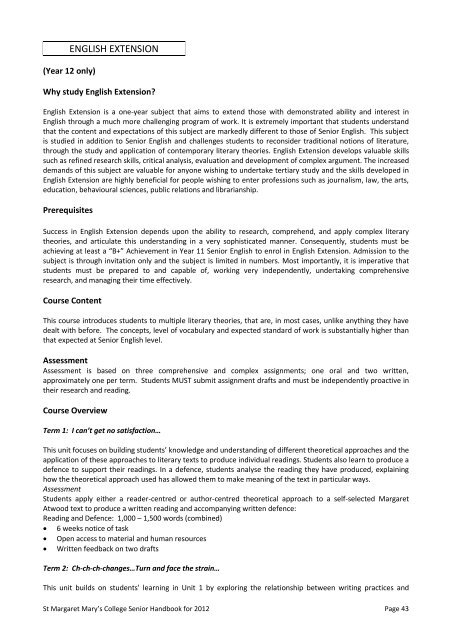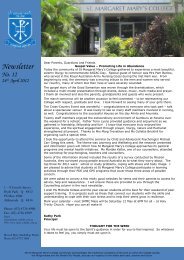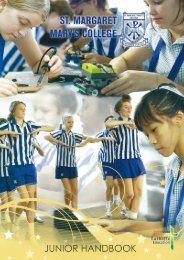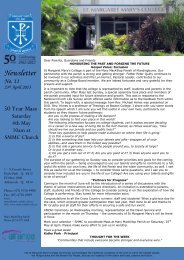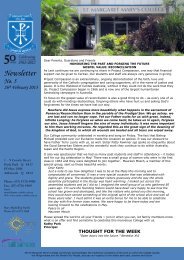SENIOR HANDBOOK for 2012
PRINCIPAL'S MESSAGE - St Margaret Mary's College
PRINCIPAL'S MESSAGE - St Margaret Mary's College
- No tags were found...
You also want an ePaper? Increase the reach of your titles
YUMPU automatically turns print PDFs into web optimized ePapers that Google loves.
(Year 12 only)<br />
ENGLISH EXTENSION<br />
Why study English Extension?<br />
English Extension is a one-year subject that aims to extend those with demonstrated ability and interest in<br />
English through a much more challenging program of work. It is extremely important that students understand<br />
that the content and expectations of this subject are markedly different to those of Senior English. This subject<br />
is studied in addition to Senior English and challenges students to reconsider traditional notions of literature,<br />
through the study and application of contemporary literary theories. English Extension develops valuable skills<br />
such as refined research skills, critical analysis, evaluation and development of complex argument. The increased<br />
demands of this subject are valuable <strong>for</strong> anyone wishing to undertake tertiary study and the skills developed in<br />
English Extension are highly beneficial <strong>for</strong> people wishing to enter professions such as journalism, law, the arts,<br />
education, behavioural sciences, public relations and librarianship.<br />
Prerequisites<br />
Success in English Extension depends upon the ability to research, comprehend, and apply complex literary<br />
theories, and articulate this understanding in a very sophisticated manner. Consequently, students must be<br />
achieving at least a “B+” Achievement in Year 11 Senior English to enrol in English Extension. Admission to the<br />
subject is through invitation only and the subject is limited in numbers. Most importantly, it is imperative that<br />
students must be prepared to and capable of, working very independently, undertaking comprehensive<br />
research, and managing their time effectively.<br />
Course Content<br />
This course introduces students to multiple literary theories, that are, in most cases, unlike anything they have<br />
dealt with be<strong>for</strong>e. The concepts, level of vocabulary and expected standard of work is substantially higher than<br />
that expected at Senior English level.<br />
Assessment<br />
Assessment is based on three comprehensive and complex assignments; one oral and two written,<br />
approximately one per term. Students MUST submit assignment drafts and must be independently proactive in<br />
their research and reading.<br />
Course Overview<br />
Term 1: I can’t get no satisfaction…<br />
This unit focuses on building students’ knowledge and understanding of different theoretical approaches and the<br />
application of these approaches to literary texts to produce individual readings. Students also learn to produce a<br />
defence to support their readings. In a defence, students analyse the reading they have produced, explaining<br />
how the theoretical approach used has allowed them to make meaning of the text in particular ways.<br />
Assessment<br />
Students apply either a reader-centred or author-centred theoretical approach to a self-selected Margaret<br />
Atwood text to produce a written reading and accompanying written defence:<br />
Reading and Defence: 1,000 – 1,500 words (combined)<br />
6 weeks notice of task<br />
Open access to material and human resources<br />
Written feedback on two drafts<br />
Term 2: Ch-ch-ch-changes…Turn and face the strain…<br />
This unit builds on students' learning in Unit 1 by exploring the relationship between writing practices and<br />
St Margaret Mary’s College Senior Handbook <strong>for</strong> <strong>2012</strong> Page 43


